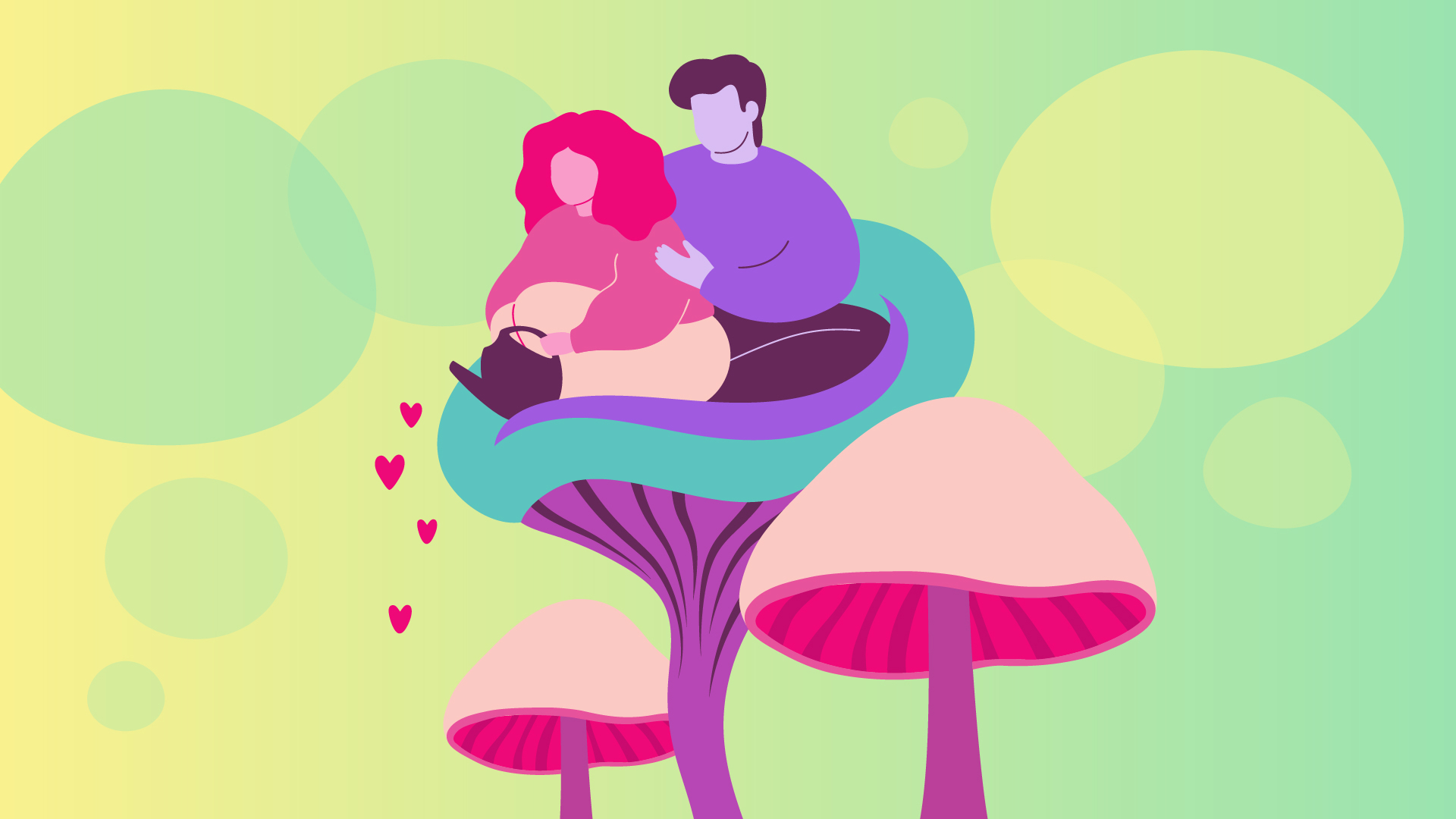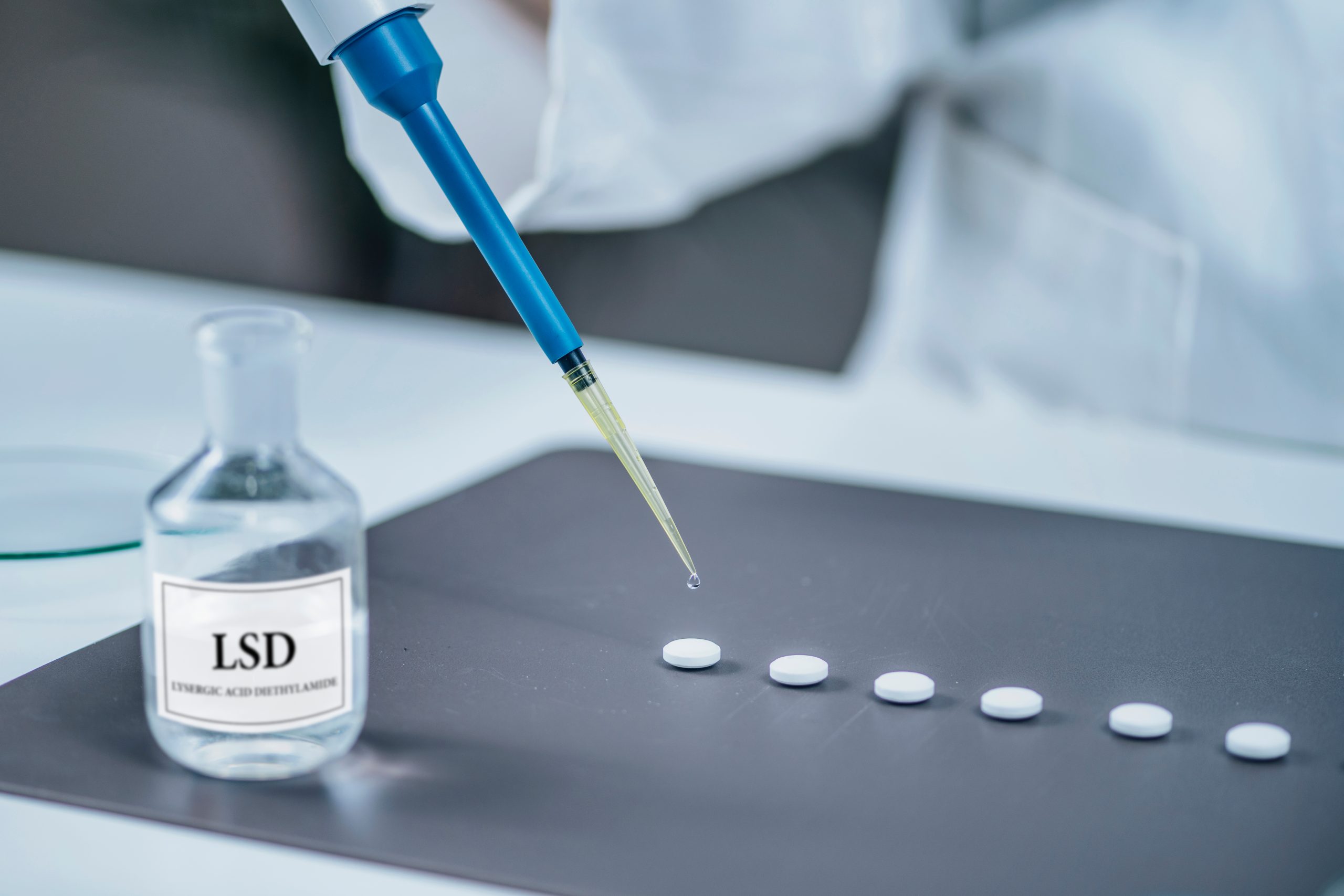Austrian poet Rainer Maria Rilke once wrote: “For one human being to love another human being: That is perhaps the most difficult task that has been entrusted to us, the ultimate task, the final test and proof, the work for which all other work is merely preparation.”
In the early, oxytocin-saturated days of a new romance, loving another human being might seem all too easy. Later down the track, however, when the infatuation hormones wear off and the grind of everyday life sets in, roadblocks can pop up, communication can break down, and love can turn cold.
Some cut their losses and run, while others try to talk it out or see a counselor. And some turn to psychedelics and therapy.
“Psychedelic couples therapy offers a reset from the deep trenches that have become overly familiar relationship patterns,” said Sarah Tilley, psychedelic guide, founder, and CEO of Beautiful Space in the UK. “With the help of psychedelics, couples can detangle unconscious behavior, so they can embark on relationship version 2.0.”
Related
What are psychedelic mushrooms and psilocybin?
Psychedelic couples therapy has been around longer than you think
Like many elements of psychedelic medicine, the legacy of psychedelic couples therapy stretches way back. Early therapy focused primarily on MDMA, especially in the ‘70s, with pioneering psychedelic researchers Ann and Sasha Shulgin. They discovered that the substance was an excellent tool for encouraging communication and navigating relationship issues.
Other researchers, such as George Greer and Requa Tolbert, conducted MDMA-assisted psychotherapy with couples in the mid-’80s, finding that the psychedelic could help overcome the fear of emotional hurt and promote introspection.
The ‘80s also saw psychedelic psychotherapist Rick Ingrasci working with MDMA in therapeutic settings. Ingrasci treated about 100 patients with MDMA in approximately 150 sessions from 1980 to 1985, one-third of which were with couples. He thought MDMA helped dissolve neurotic fears so couples could communicate in honest, compassionate ways, and be authentic with themselves and their significant other. (Ingrasci was later accused of initiating sexual contact during MDMA sessions with clients and lost his medical license.)
MDMA was banned in the US in 1985, and added to the list of Schedule I drugs. MDMA-assisted couples therapy tapered off, although some practitioners continued underground.
Related
How to dose psychedelic mushrooms
Why do people turn to psychedelic couple’s therapy?
In the United States in 2020, there were 630,505 divorces (vs. 1,676,911 marriages). While this sounds like a lot, it’s important to note that divorce rates have actually been steadily declining in recent years, for a variety of reasons. Divorce can carry weighty costs, both financial and health-related. In situations where the motivation for couples to stay together is high but serious problems are still present, psychedelic couples therapy can represent a transformative intervention.
Tilley, who holds psychedelic couples therapy and retreats through Beautiful Space, sees couples who seek healing for diverse problems. Unresolved long-term disagreements, communication troubles, major life changes, depression, or a lack of purpose are recurring themes.
However, the most common issues that bring couples to Beautiful Space are about sex and intimacy.
“Something has changed and one or both have lost the desire to be aroused by the other,” reflected Tilley. “There might have been a breach of trust or a loss of body confidence, a change in hormones, or past sexual trauma interrupting intimacy. Some couples want help shifting from monogamy to an open relationship, while others want to find meaning after being married for 45 years.”
Tilley emphasized that many issues are underpinned by generational trauma, which occurs when parents unintentionally pass down trauma to their children. According to Tilley, psychedelics can be a powerful tool for breaking its shackles.
“People don’t come for therapy on [generational trauma], but for most individuals in a couple, it’s what we end up working on,” said Tilley. “You come to understand how your childhood story, traumas, and inherited family patterns might play a part in the dynamics of your current relationship.”
Though the specific reasons that prompt couples to cross the psychedelic therapy threshold vary, nearly all who come to her have reached a fork in the road.
“They are facing separation or they need to try something very different,” said Tilley. “They might have children, a house, or a business together, so they see separation as an absolute last resort.”
Related
What is MDMA (aka Ecstasy or Molly)?
How can psychedelics help relationship issues?
Psychedelics work on the brain by interrupting negative habits. A single psychedelic session can transform one’s perspective, address detrimental behavioral patterns, and thus serve as a powerful catalyst for change. These potent substances have been used for issues such as excessive overthinking, addictive behaviors like smoking and alcohol-use disorder, and even narcissism. Researchers believe psychedelics can be used to shift rigid, entrenched behaviors and habits to improve health and well-being.
Integrating psychedelics into therapy sessions can also provide individuals with profound perspectives of their moods, behavioral patterns, and beliefs. This increased self-awareness may equate to greater relationship awareness.
“The psychedelic experience is individual to each person and results in individuation in the relationship,” said Tilley. “When couples are too entangled, it’s hard to take responsibility for what each brings to the relationship.”
For Sarah Melancon, PhD, sociologist and certified sexologist, regular MDMA use with her partner has helped them address diverse personal and relationship issues. Melancon had long been living with social anxiety disorder and a communication disorder called selective mutism—a severe anxiety disorder where a person is unable to speak in specific social contexts, such as in public places, or at work. Melancon believes MDMA helped her find her voice.
“The first time I took MDMA, it changed my entire life—parts of me were literally able to speak that had previously been frozen,” she said.
Regular MDMA sessions every few months created space for Melancon and her husband to process issues, discuss the future, bond, and connect sexually.
“MDMA allowed us to communicate freely with empathy and compassion. We could discuss issues that would normally cause a fight, and instead feel love and understanding for each other; we were able to explore sexuality together in ways I didn’t even know were possible,” she said. “Because of our time on MDMA together, my orgasms became a regular part of our relationship, which I had never even experienced with another person before.”
Melancon also stresses that MDMA shouldn’t be treated as a quick-fix relationship panacea. While the substance allowed her and her husband to share incredible experiences, they also had to work on building communication skills and address issues from past trauma, insecure attachment, and past relationships to keep the connection alive. Individuals and couples therapy has since helped them to integrate the insights from their MDMA experiences.
Related
How do psychedelics work?
What happens during a psychedelic couples therapy session?
At Beautiful Space, the couples therapy program is a three-part course designed to reeducate relationship skills. It’s held both online and in person, and comprises 18 hours of therapy time over three months. Couples undergo two screening sessions and two preparation sessions ahead of the trip, and then a private one-day medicine retreat with psilocybin truffles, held in Amsterdam. Four integration sessions are held after the trip.
According to Tilley, preparation helps the couple to understand their mindset and define a positive path forward. Research shows that mindset and intentionality play a major role in the psychedelic experience.
Following the screening and preparatory sessions, couples then embark on the medicine day, which is structured as an eight-hour retreat. The medicine day begins with the couple further refining their intentions for the journey for several hours, focusing on their desired outcome. Tilley then leads them into the ceremony of preparing and consuming the truffles, and their individual trips begin.
Couples journey separately with eye masks and music for around 4 hours, while the therapist acts as the “sitter,” holding space and making sure everyone feels safe and comfortable on their trip.
“Sometimes the couples take a break and talk to each other or to me,” said Tilley. “They might tell me a little of what is going on for them, which I write down, or they might want to take a break to embrace the other. These moments are beautiful, and I will step out of the room for a while to give a couple privacy.”
When the trip is over, the last hour of the medicine day retreat is spent discussing what happened and relating it to the work the couple has been doing in therapy on themselves and their relationship. Tilley counts these among the most profound and meaningful moments she’s experienced as a therapist. Four further integration sessions following the medicine day retreat help to transform their mind-altering experiences into everyday change.
“Couples talk about their psychedelic experience together, discussing slivers of childhood memories, putting meaning into abstract visions, and relating them to very real-life challenges, regrets, and mistakes,” she said. “When the couple hears each other being so raw and honest, they inevitably feel compassion, and a big shift occurs in the relationship.”
And then there are also those, like Melancon, who consume psychedelics with their significant other at home, and without a therapist or guide present.
“Typically, we would take MDMA in the evening, along with some supplements intended to offset potential negative effects on the brain and body, like vitamin C, magnesium, 5-HTP, and Vitamin E,” she explained.
“It would take about an hour or so to kick in, and then a few hours into the experience, we would typically take a second dose.” That second dose would see them talking and connecting until 3 or 4am, and then they’d rest the next day.
Melancon acknowledges that their process was very casual and she would have carried out the sessions in a more formal setting with a trained therapist had that been available. Nonetheless, she only has good things to say about the MDMA sessions with her husband.
“While it was certainly not the only thing we needed for a happy marriage, I truly don’t think we’d be as happy as we are today, 15 years later, without it.”
By submitting this form, you will be subscribed to news and promotional emails from Leafly and you agree to Leafly’s Terms of Service and Privacy Policy. You can unsubscribe from Leafly email messages anytime.





































